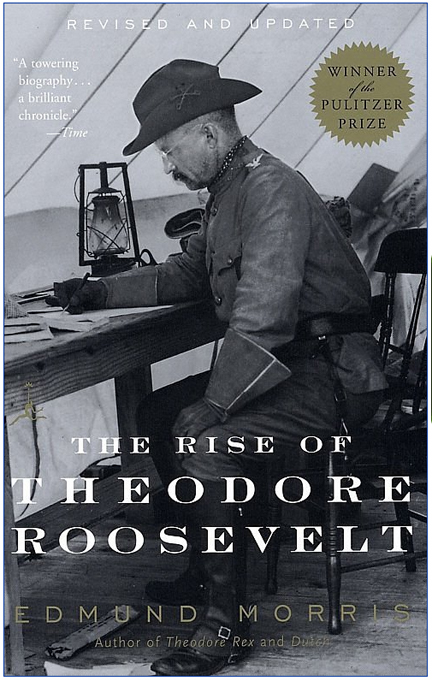Rare Book Monthly
Book Catalogue Reviews - July - 2003 Issue
The Rise of Theodore Roosevelt By Edmund Morris
A book review by Bruce McKinney
I had the opportunity recently to read The Rise of Theodore Roosevelt by Edmund Morris, a book that won, and thoroughly deserved, a Pulitzer Prize. I came to this book having already read Theodore Rex, Mr. Morris’ second volume of a planned three volume biography of Roosevelt’s life. This volume, the first in the series, covers the period from his birth in 1858 until 1901 when, as Vice President, he assumes the Presidency upon the death of William McKinley. For those who enjoy history and biography this is a very interesting interpretation.
Theodore Roosevelt, the man, personifies America’s transition from an important if isolated nation, to that of a world power. His life began in New York City in the year of the Lincoln Douglas debates and ended in 1919, a few months before the Treaty of Versailles was signed ending the First World War.
He was born into wealth and managed to spend a substantial portion of his inheritance early. But he was also able to find ways to make money and so to be able to maintain a wealthy lifestyle even as his appetites grew to exceed his underlying capital. Chief among his money-making strategies was the writing of books. Certainly no President before or since has come close to his majestic output of 38 volumes. Few authors, in a life of 61 years, accomplish this. And of course in his life he had a few other jobs such as: Governor of New York, Assistant Secretary of the Navy, New York State Assemblyman, Colonel in the United States Army, and two terms, less a few months, as President of the United States -- and he did all of these things before he was 50. Seen in this way, it is hard to understand that we do not know more about him. Even in 1941, with the opening of Arsenic and Old Lace, his name remained familiar to stage goers. The last sixty years have worn some of the gleam from his star. He is also the person for whom the icon of babyhood was named: the Teddy Bear.
He was a transitional figure. He was born at a time when America was not yet an industrial power. Its social policies more reflected the images of Charles Dickens than Mark Twain. And its banking and financial system did not yet have safeguards to ensure an orderly transition from good to bad times and back. In the 19th century America lurched from panic to banking crisis to success followed by failure once again. America was learning but it was learning the hard way – by making mistakes. Government was an ongoing argument pitting business against labor and states against a stronger national government.
Theodore Roosevelt’s coming of age corresponded with the gathering potential for America to play a larger role in world affairs (talk softly and carry a big stick), the increasing demands of the working class and the building out of the American West. Roosevelt was perhaps uniquely capable to understand how each of these complex issues









